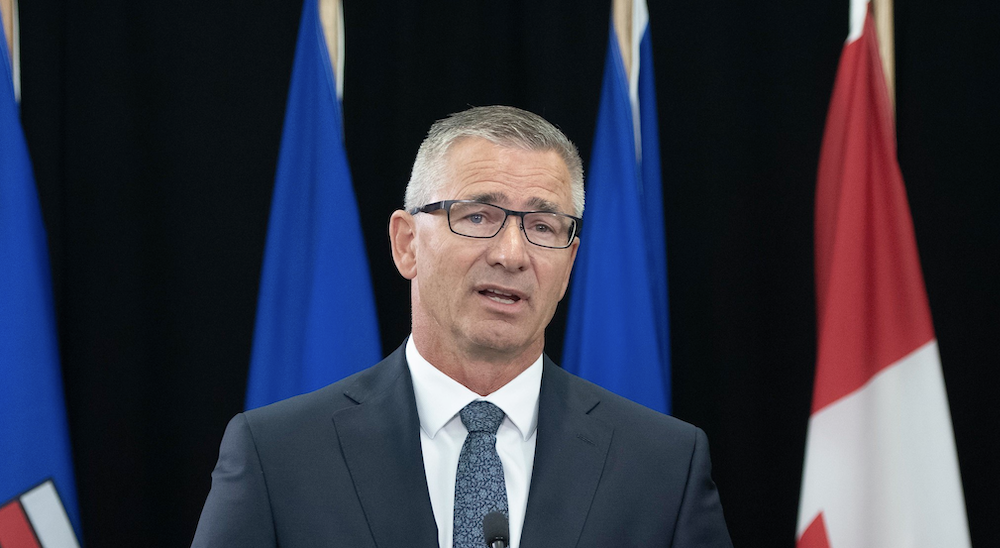Alberta’s United Conservative Party government has suddenly retreated from controversial battles with nurses and teachers that were a priority for Premier Jason Kenney and his inner circle almost since their election in the spring on 2019.
Over the Labour Day weekend, a representative of the Alberta Health Services bargaining committee contacted the United Nurses of Alberta to say the employer had a new mandate from the government to amend their bargaining proposal before starting formal mediation under the Alberta Labour Relations Code.
When the sides met online Tuesday to discuss the new employer bargaining position, most of the rollbacks demanded by the government since the recommendations of Janice MacKinnon’s “Blue Ribbon Panel” in August 2019 set the stage for a big fight with public sector unions had disappeared.
Gone was the plan to immediately cut the pay of the Registered Nurses and Registered Psychiatric Nurses represented by UNA by three per cent, followed by years of zeros. Also gone were most of the major rollbacks to contract provisions that would have gutted the nurses’ collective agreement.
This fight is not over. The government still wants to eliminate lump-sum payments that would cost nurses about two per cent in annual salary, and it continues to seek significant changes to contract language. So there is still hard bargaining ahead. And nurses, exhausted from a year and a half fighting COVID-19, are still furious at the direction negotiations took.
But if not quite a surrender, the new AHS bargaining position is a significant retreat from where it stood just a week ago.
“UNA was pleased that the new employer bargaining position dropped several offensive proposals, but we will continue our effort in negotiations to reach an agreement that will address the critical problem of attrition and retention now faced by AHS in every part of the province,” UNA labour relations director David Harrigan said in a statement yesterday.
Meanwhile, the Alberta Teachers Association announced yesterday that late last week it had reached an agreement with the government to ensure the Alberta Teachers Retirement Fund would “remain in full control of strategic investment policies for teacher pensions.”
The new agreement between ATRF and the Alberta Investment Management Corp., better known as AIMCo, replaced an “agreement” imposed by Finance Minister Travis Toews in December. The veto AIMCo would have had over ATRF decisions is kaput.
“This is a huge victory for teachers,” said ATA president Jason Schilling in a news release.
Since the ATA has achieved everything it hoped to get by suing the government over the arbitrary agreement that was hugely unpopular with teachers, the release said, “the association will be discontinuing its legal challenge.”
There may be more to come. There are other public sector unions from which the UCP also hoped for major takeaways. And other public sector pension plans that are not happy about the requirement to invest through AIMCo.
Nevertheless, it’s obvious the government has blinked in the past few days — perhaps so hard it looks like the finance minister has sand in his eyes!
What happened?
Undoubtedly, the pandemic is a big part of the story.
On top of everything else, COVID-19 has thrown health care facilities and schools into chaos. The Kenney government’s counter-productive response to the pandemic is deeply unpopular, as is the premier himself. Recent polling suggests that if an election were held tomorrow, the NDP Opposition led by former premier Rachel Notley would win handily.
For her part, Notley called the government’s effort to slash nurses’ wages during an international nurse shortage and a pandemic “beyond idiotic.”
“We’re actually now at a point of pure incompetence,” she exclaimed.
The fight with nurses, the chronic staffing shortages in Alberta hospitals, and the hurried reopening of schools are all perceived by Albertans as part of that misconceived COVID response.
On top of everything else, it seems highly unlikely the government could have survived a labour dispute with either nurses or teachers.
In a way, it was unlike this government to realize that. Most governments would have executed a strategic retreat from such untenable positions months ago. But so far in its short history, the UCP doesn’t seem to have considered normal political calculations when setting its major policies, only its leaders’ ideological preconceptions. This has led to more than one undignified retreat.
The provincial electoral timetable is certainly part of this story too. An election may not be scheduled until the spring of 2023, but the months in which the UCP has the time to engage in difficult fights would be rapidly running out now even without a fourth wave of COVID leaving the province with the highest infection rate and caseload in Canada, packed hospitals and ICUs, beds empty because there are no nurses to care for their waiting occupants, and furious patients requiring treatment for other conditions who are told they’ll just have to wait.
And — who knows? — maybe even the federal election may have something to do with it.
Federal Conservative Party Leader Erin O’Toole’s stature is not exactly being helped by Premier Kenney’s belligerent policies, evident mishandling of the biggest health care crisis in a century, and deep unpopularity and distrust among voters.
One imagines Kenney didn’t want to have to wear the blame for a loss by O’Toole, either. This would certainly explain the premier’s latest, post-holiday disappearance.
Whatever the reason, the UCP’s radical agenda for Alberta appears to be in retreat — at least for now.
David Climenhaga, author of the Alberta Diary blog, is a journalist, author, journalism teacher, poet and trade union communicator who has worked in senior writing and editing positions at The Globe and Mail and the Calgary Herald.
Image: Chris Schwarz/Government of Alberta




